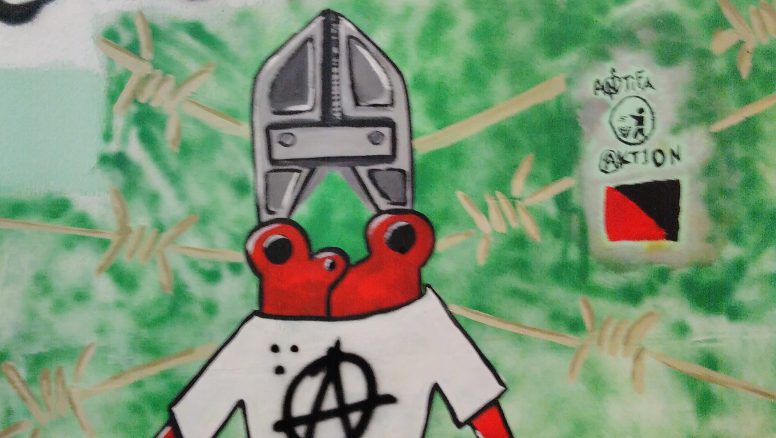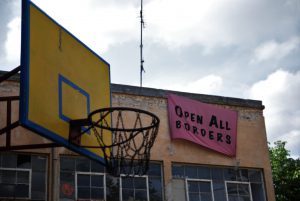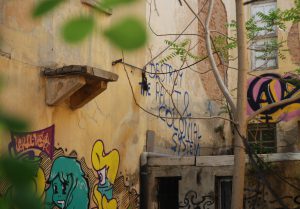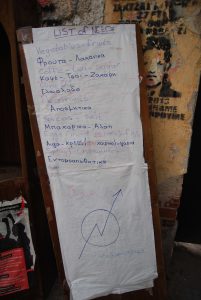Orfanotrofio-Squat in Thessaloniki: Self-organized Refugee and Migrant Solidarity Project
The Orfanotrofio squat in the East of Thessaloniki is one of the many places of solidarity with the refugee struggle in Greece. Orfanotrofio was occupied by people prevented from passing the Greek-Macedonian border and solidarity groups in early December 2015, when only refugees with papers showing Syria, Afghanistan or Iraq as a country of origin were allowed to cross to Macedonia and access to Idomeni was heavily state-controlled. A few days after Orfanotrofio was occupied, the self-organised camp in Idomeni was evicted – making the squat an important space for housing and organizing together. The house has huge rooms inside and a nice garden outside.
The idea of Orfanotrofio was and is to build “a place where people can struggle for their rights together”, O. said. O. came from Morocco and is now living in the squat. Before coming to Orfanotrofio, O. was in Idomeni, from where he managed to cross the borders to Macedonia, but was arrested and pushed back to Greece. In Idomeni he started protesting against the situation. He described the squat as a kind of “political home and goal” – a place that people can create and where they can struggle for their rights no matter where they are from and where they want to go. “In other European countries the situation will not be better. Also there you will be a minority, a refugee with no rights. We have to act. Here, at the place where we are living, here in this squat we have the possibility to create a community and to build up something together.”
The house was formerly used as an orphanage, but has not been used for many years. In the beginning, more than 100 hundred refugees stayed in the house, supported by solidarity structures. Currently, around 70 people live in Orfanotrofio, but there is also a lot of mobility: “people come and people go”. At the moment, people from many different countries live in the squat – people from Iran, Syria, Gambia, Mali or Ukraine.
The squat is an important place for people who struggled against the police or who fall through the dysfunctional asylum system. For example, people from Western and Northern African countries, who do not receive support from official structures, and are instead often brought to detention centers for deportation, can stay in the house. The squat builds spaces of protection and support. Nevertheless, their conditions stay harsh: because they do not get work permits, a lot of them have to work without any kind of security. So people get exhausted but they also manage to struggle for their rights.
For new people who want to move in, they have a “welcome team” – a small group that shows the rooms and the house explains the rules and the ideas of the place. They also ask about documents and the asylum process, not for controlling people but for knowing about their situation and to be able to support people if something happens. They try not to take too many new people in at the same time, because the aim is to create a community first, and to find out what can be done together. Orfanotrofio has 3 different meetings: one house meeting for the residents of the house, one public meeting with residents and solidarity groups, and one closed meeting with the active part of the solidarity group and some of the residents. The meetings are important for the political work within and between the groups.
The house is located in a left-wing-area of Thessaloniki and well-embedded in the solidarity structures of this neighborhood. There is a lot of solidarity for the refugees in the Greek society and the fascist movement does not seem very strong at the moment. Several people emphasized that the financial crisis in Greece has increased solidarity rather than diminished it. N., who is active in the organizing and support structures, said: ‚People turned away from material aims, towards other values and helping each other‘. The solidarity and material support from the neighbourhood helps to keep the squat going.
For the summer, they plan to open a café in the garden and build up a library with books in different languages in the house.




